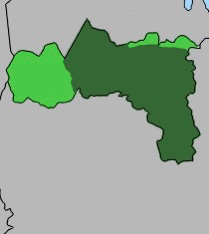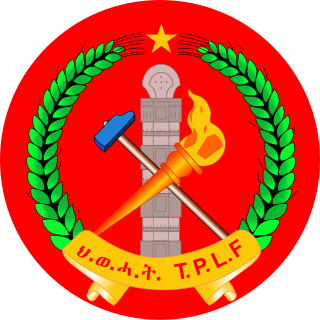
The Tigray People's Liberation Front, also called the Tigrayan People's Liberation Front, is a left-wing ethnic nationalist, paramilitary group, and the former ruling party of Ethiopia. It was classified as a terrorist organization by the Ethiopian government from May 2021 until its removal from the list in March 2023. In older texts and Amharic publications, it is known as Woyane or Wayane.

The Tigray War was an armed conflict that lasted from 3 November 2020 to 3 November 2022. The war was primarily fought in the Tigray Region of Ethiopia between forces allied to the Ethiopian federal government and Eritrea on one side, and the Tigray People's Liberation Front (TPLF) on the other.

The Mai Kadra massacre was a massacre and ethnic cleansing carried out during the Tigray War on 9–10 November 2020 in the town of Mai Kadra in Welkait in northwestern Ethiopia, near the Sudanese border. Responsibility was attributed to a pro-TPLF youth group and forces loyal to the Tigray People's Liberation Front (TPLF) in the EHRC-OHCHR Tigray Investigation, preliminary investigations by Amnesty International, the Ethiopian Human Rights Commission (EHRC) and the Ethiopian Human Rights Council (EHRCO), and interviews conducted in Mai Kadra by Agence France-Presse. The Office of the United Nations High Commissioner for Human Rights (OHCHR) and EHRC reported that at least 5 Tigrayans were killed in Mai Kadra by Amhara militas such as Fano in retaliation. Tigrayan refugees in Sudan told multiple news outlets that Tigrayans in Mai Kadra were targeted by either Amhara militias, the Ethiopian National Defense Force (ENDF), or both.
This timeline of the Tigray War is part of a chronology of the military engagements of the Tigray War, a civil war that began in the Tigray Region of Ethiopia in early November 2020.

Fano is an ethno-nationalist Amhara militia and former protest movement. It has engaged in violent clashes throughout Ethiopia in the name of neutralizing perceived threats to the Amhara people. Fano has absorbed many units and personnel of the Amhara Regional Special Forces that did not integrate into the Ethiopian National Defense Force (ENDF). Fano militias are have been involved in armed conflicts with the Tigray People's Liberation Front (TPLF), the Oromo Liberation Army (OLA), and the ENDF. They have also clashed with the Sudanese Armed Forces (SAF) on the border of Ethiopia and Sudan.
On 3–4 November 2020, forces loyal to the Tigray People's Liberation Front (TPLF) launched attacks on the Ethiopian National Defense Force (ENDF) Northern Command headquarters in Mekelle and bases in Adigrat, Agula, Dansha, and Sero in the Tigray Region, marking the beginning of the Tigray War. The Ethiopian federal government stated that these attacks justified the ENDF's military action against the TPLF, which, at the time the attacks occurred, held control over the Tigray Region. The TPLF described the action as "a pre-emptive strike."
Mulugeta Gebrehiwot Berhe is an Ethiopian peace researcher who as of 2021, was a senior fellow at the World Peace Foundation, Tufts University. He was a rebel of the Ethiopian People's Revolutionary Democratic Front (EPRDF) when the EPRDF was a guerilla army. He led the disarmament, demobilization and reintegration program of the 380,000 armed rebels after the EPRDF gained control of Ethiopia in 1991. Mulugeta was a mediator in the Darfur Peace Agreement negotiations that led to the 2006 Abuja Agreement and the 2011 Doha Agreement during peace process for the War in Darfur. He was founding Director of the Institute for Peace and Security Studies in 2007. In January 2021 during the Tigray War, Mulugeta, telephoning from the mountains in Tigray Region, described the killings of civilians by the Eritrean Defence Forces (EDF) and the Ethiopian National Defense Force (ENDF) as "genocide by decree".

Sexual violence in the Tigray War included, according to the United Nations Special Representative on Sexual Violence in Conflict, Pramila Patten, people forced to rape family members, "sex in exchange for basic commodities", and "increases in the demand for emergency contraception and testing for sexually transmitted infections".

Casualties of the Tigray War refers to the civilian and military deaths and injuries in the Tigray War that started in November 2020, in which rape and other sexual violence are also widespread. Precise casualty figures are uncertain. According to researchers at Ghent University in Belgium, as many as 600,000 people had died as a result of war-related violence and famine by late 2022. The scale of the death and destruction led The New York Times to describe it in November 2022 as "one of the world’s bloodiest contemporary conflicts."
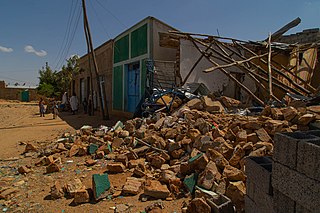
All sides of the Tigray War have been repeatedly accused of committing war crimes since it began in November 2020. In particular, the Ethiopian federal government, the State of Eritrea, the Tigray People's Liberation Front (TPLF) and Amhara regional forces have been the subject of numerous reports of both war crimes and crimes against humanity.

The Tigrayan peace process encompasses the series of proposals, meetings, agreements and actions that aimed to resolve the Tigray War.
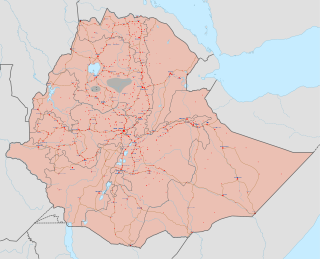
Following the 2018 dissolution of the ethnic federalist, dominant party political coalition, the Ethiopian People's Revolutionary Democratic Front, there was an increase in tensions within the country, with newly resurgent regional and ethnically based factions carrying out armed attacks on military and civilians in multiple conflicts throughout Ethiopia.
The Chenna massacre was a mass extrajudicial killing perpetrated by the Tigray Defense Forces (TDF) in and around the village of Chenna Teklehaymanot in the Amhara Region of Ethiopia during the Tigray War, between 31 August and 4 September 2021.

The TDF–OLA joint offensive was a rebel offensive in the Tigray War and the OLA insurgency starting in late October 2021 launched by a joint rebel coalition of the Tigray Defense Forces (TDF) and Oromo Liberation Army (OLA) against the Ethiopian National Defense Forces (ENDF) and government. The TDF and OLA took control of several towns south of the Amhara Region in the direction of the Ethiopian capital Addis Ababa in late October and early November. Claims of war crimes included that of the TDF extrajudicially executing 100 youths in Kombolcha, according to deral authorities.
This Timeline of the Tigray War is part of a chronology of the military engagements of the Tigray War, a civil war that began in the Tigray Region of Ethiopia in early November 2020.
This Timeline of the Tigray War is part of a chronology of the military engagements of the Tigray War, a civil war that began in the Tigray Region of Ethiopia in early November 2020.
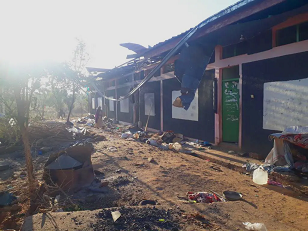
In the late hours of 7 January 2022, the Ethiopian Air Force (ETAF) carried out an airstrike on a camp for internally displaced persons (IDP) set up in Dedebit Elementary School, located in the Tigray Region of Ethiopia. Between 56 and 59 people were killed in the attack, and at least 30 others were left injured.
The Kobo massacre was an extrajudicial killing event perpetrated in Kobo district and Kobo town in North Wollo Zone of the Amhara Region of Ethiopia during the Tigray War, on 9 September 2021.

On 26 November 2021, Prime Minister Abiy Ahmed announced the Ethiopian National Defense Force (ENDF) and its allies had begun an offensive to recapture territory in the Amhara and Afar regions being occupied by the Tigray Defense Forces (TDF). Afar and Amhara militias had mobilized thousands of fighters and joined the new offensive. The ENDF and its allies were able to push TDF forces back from Debre Sina, Amhara to Alamata, Tigray (≈400 km). The Ethiopian government announced the campaign for national unity was a success and had been completed on 23 December 2021.

Since the 1990s, the Amhara people of Ethiopia have been subject to ethnic violence, including massacres by Tigrayan, Oromo and Gumuz ethnic groups among others, which some have characterized as a genocide. Large-scale killings and grave human rights violations followed the implementation of the ethnic-federalist system in the country. In most of the cases, the mass murders were silent with perpetrators from various ethno-militant groups—from TPLF/TDF, OLF–OLA, and Gumuz armed groups.
